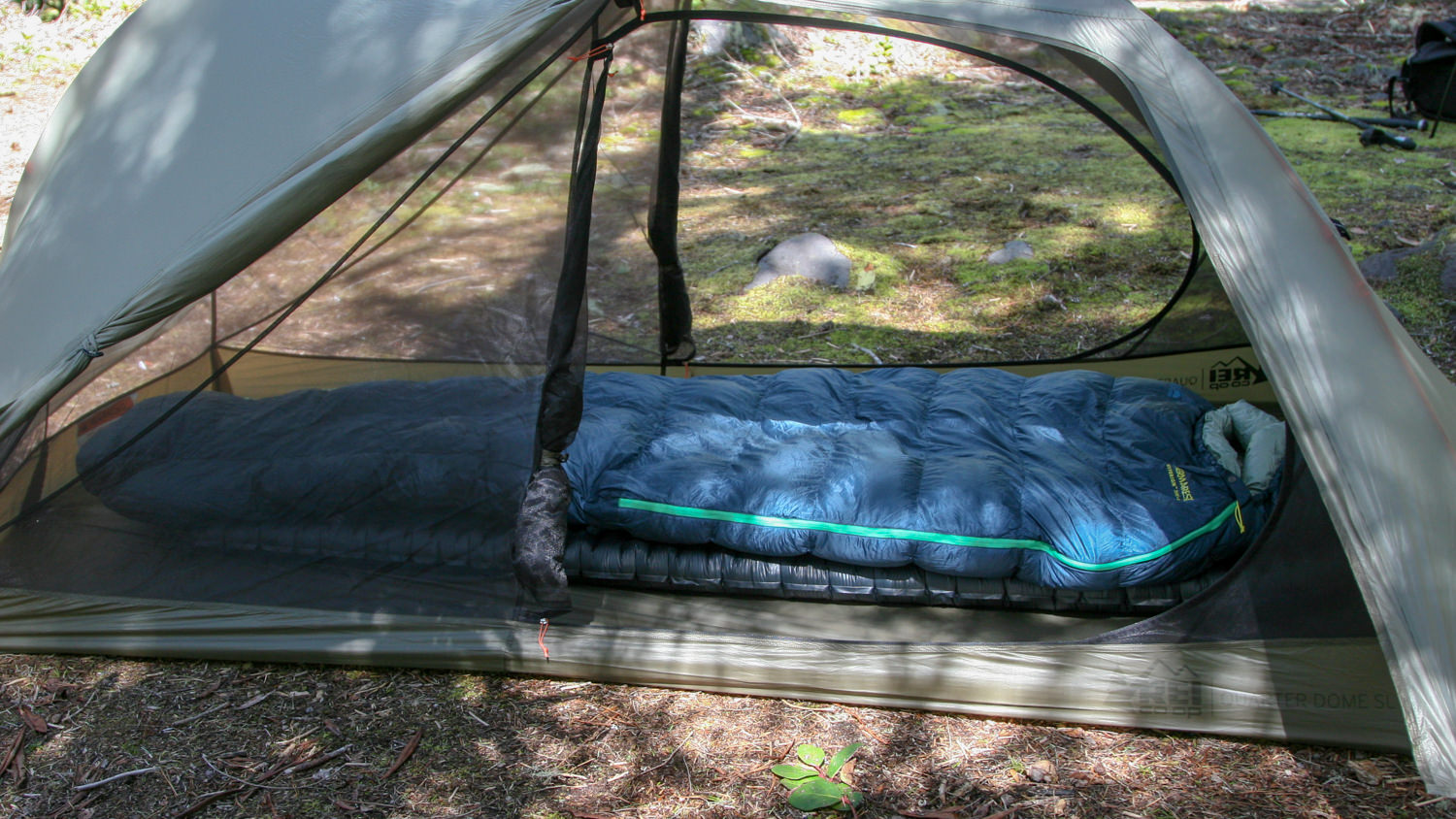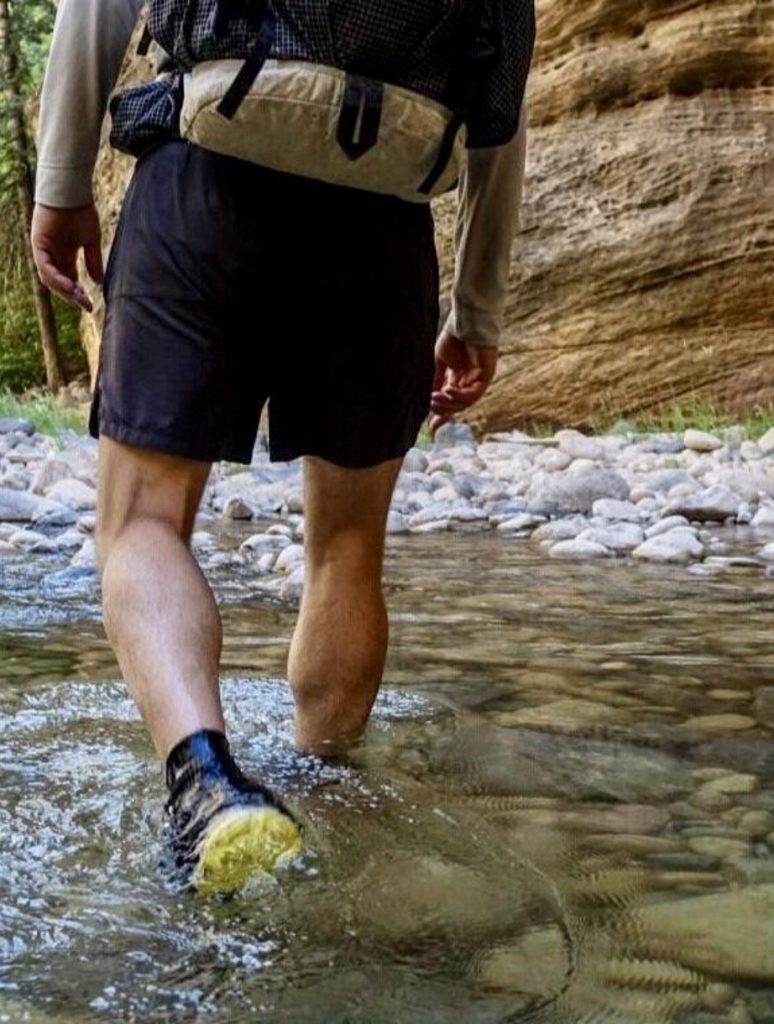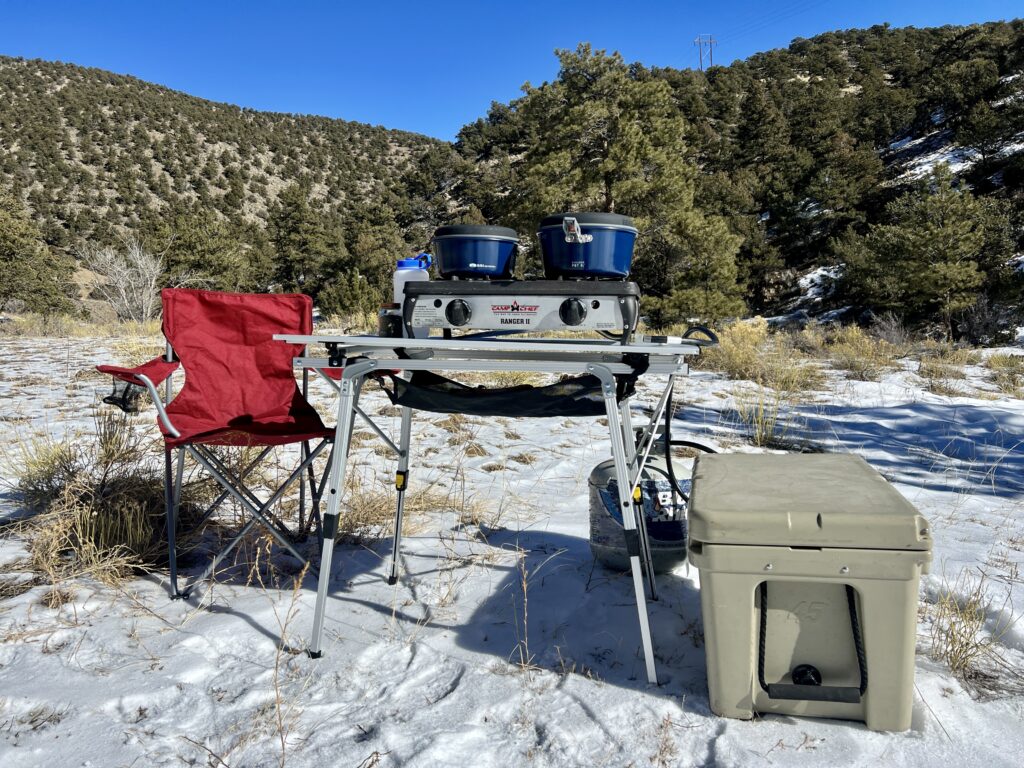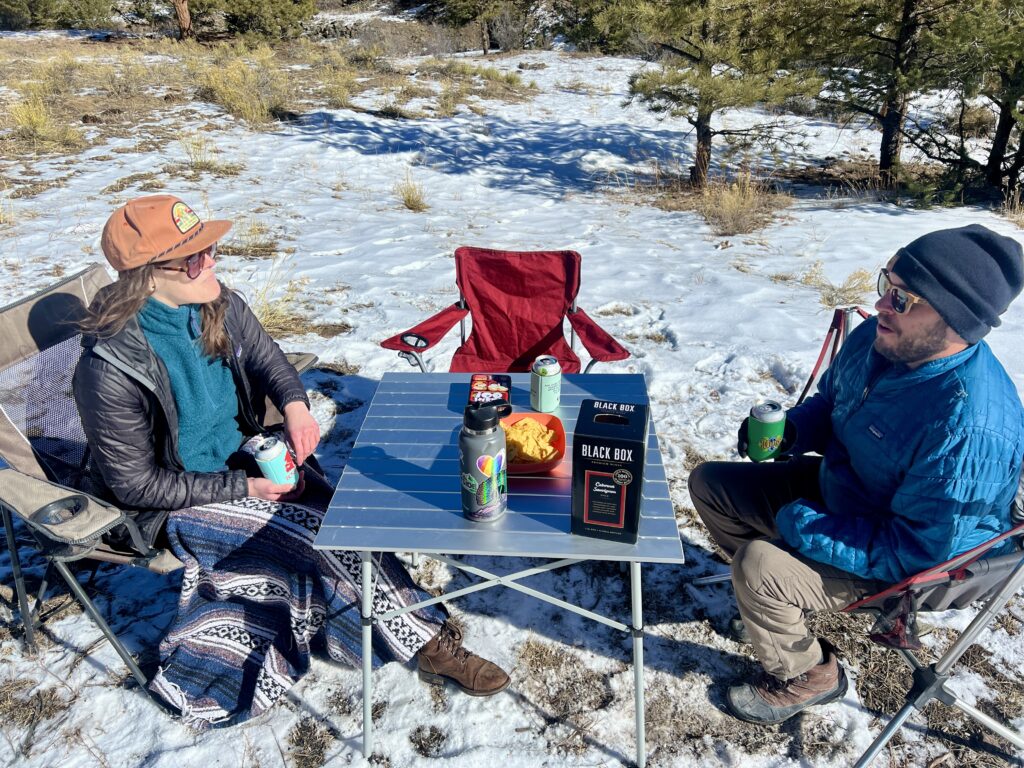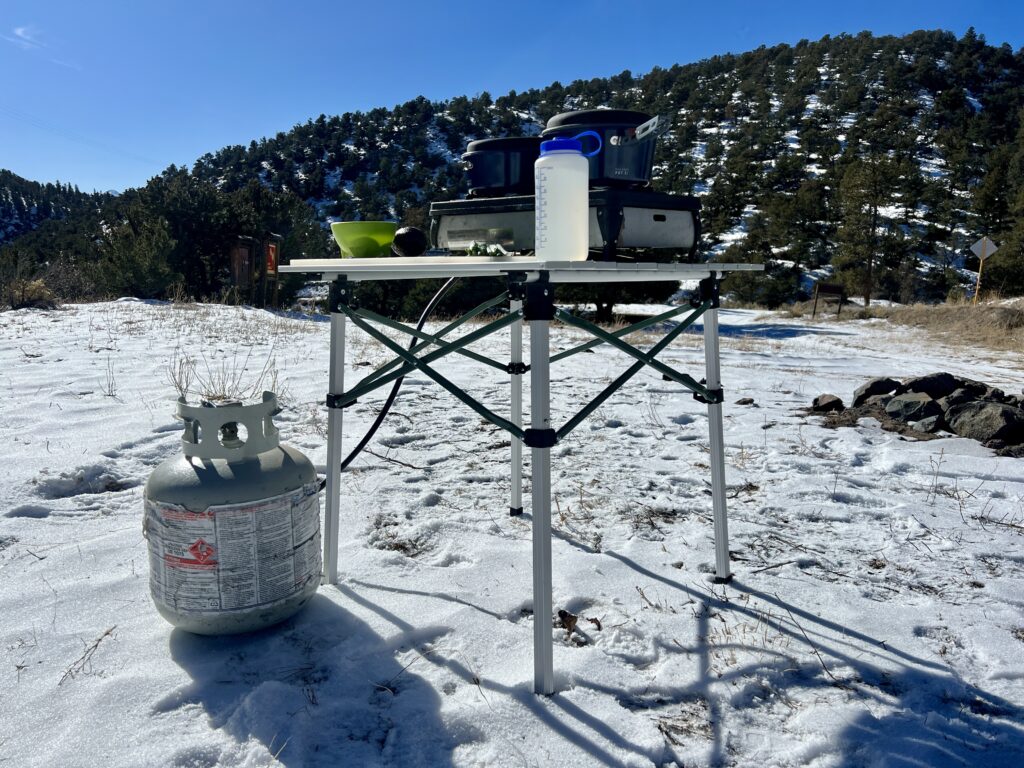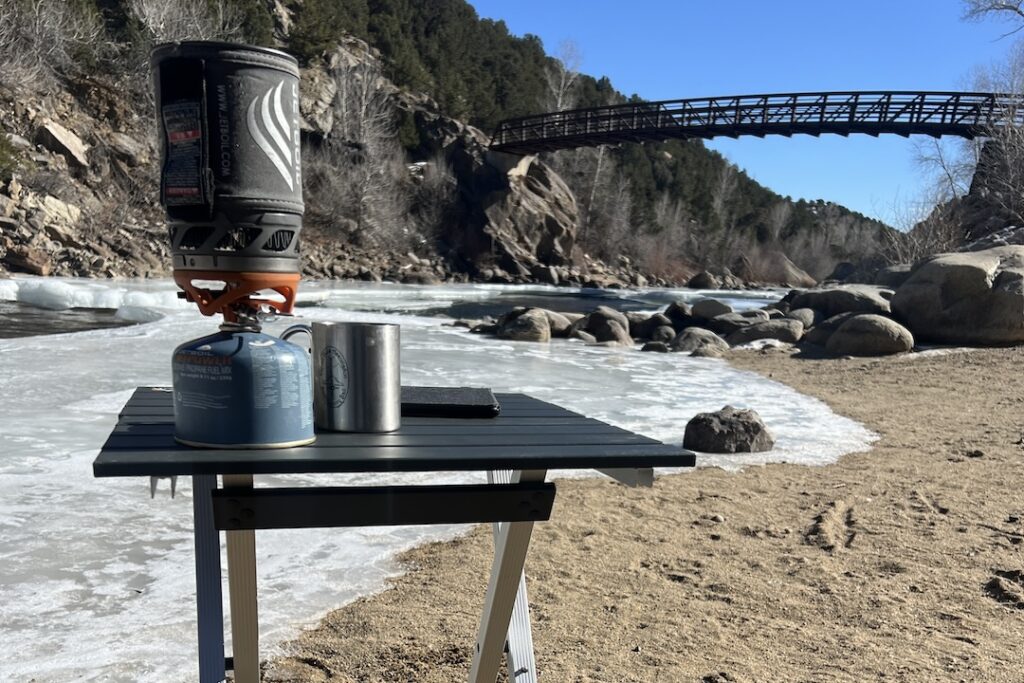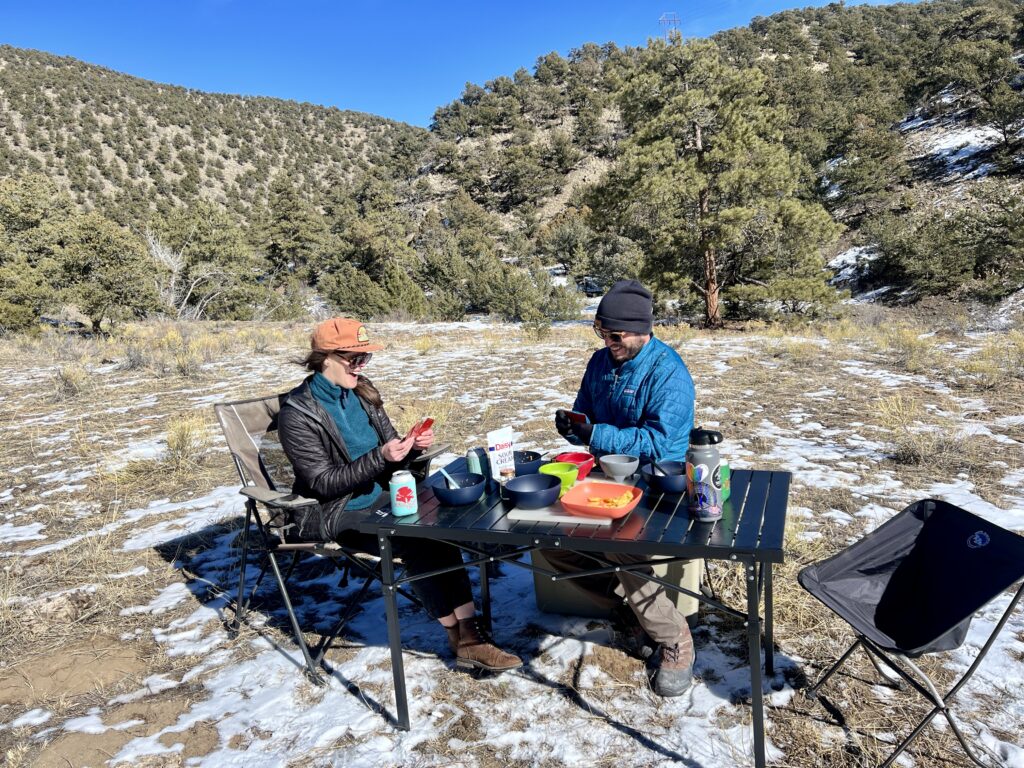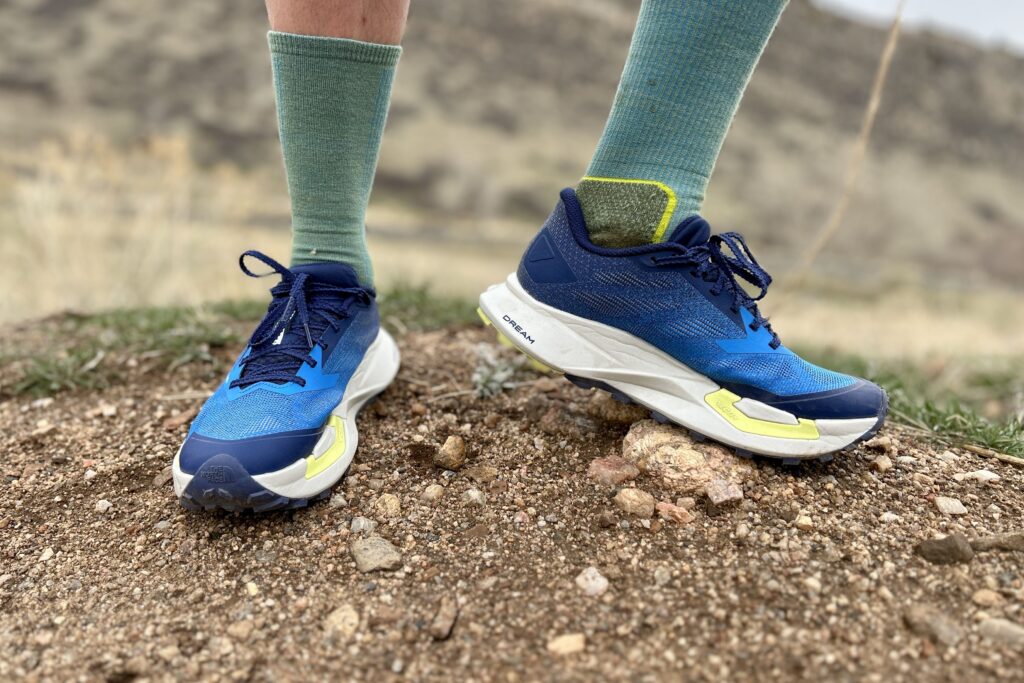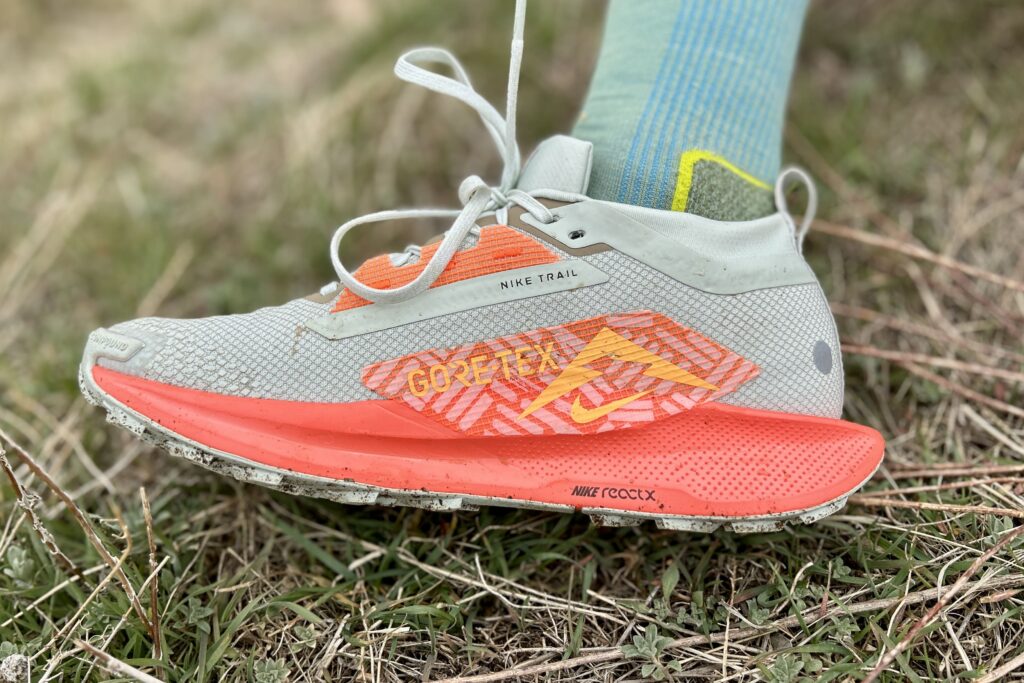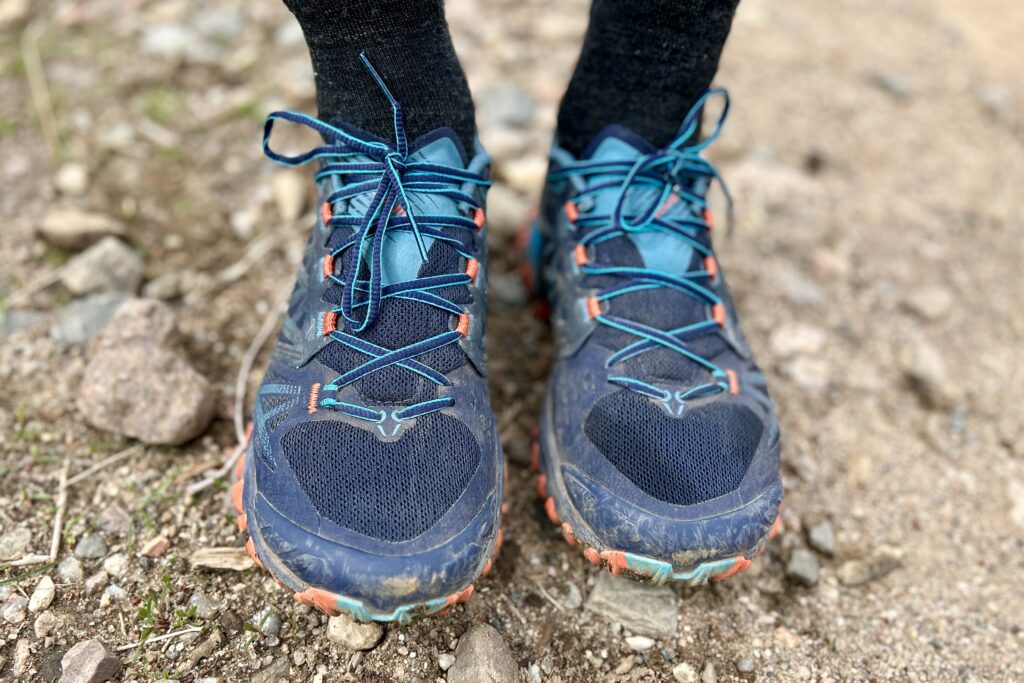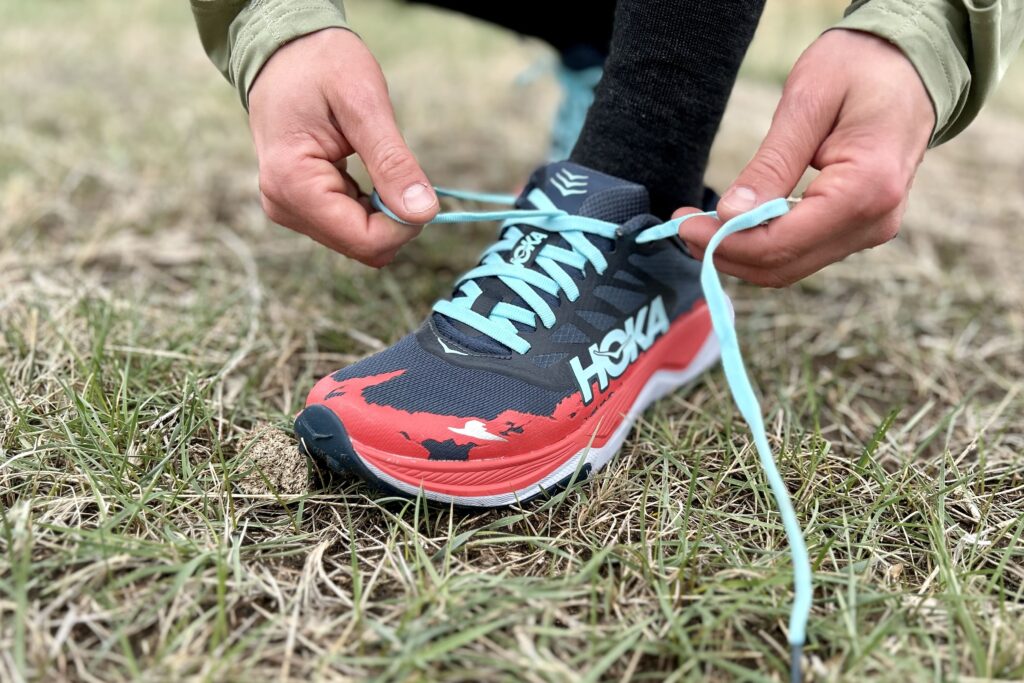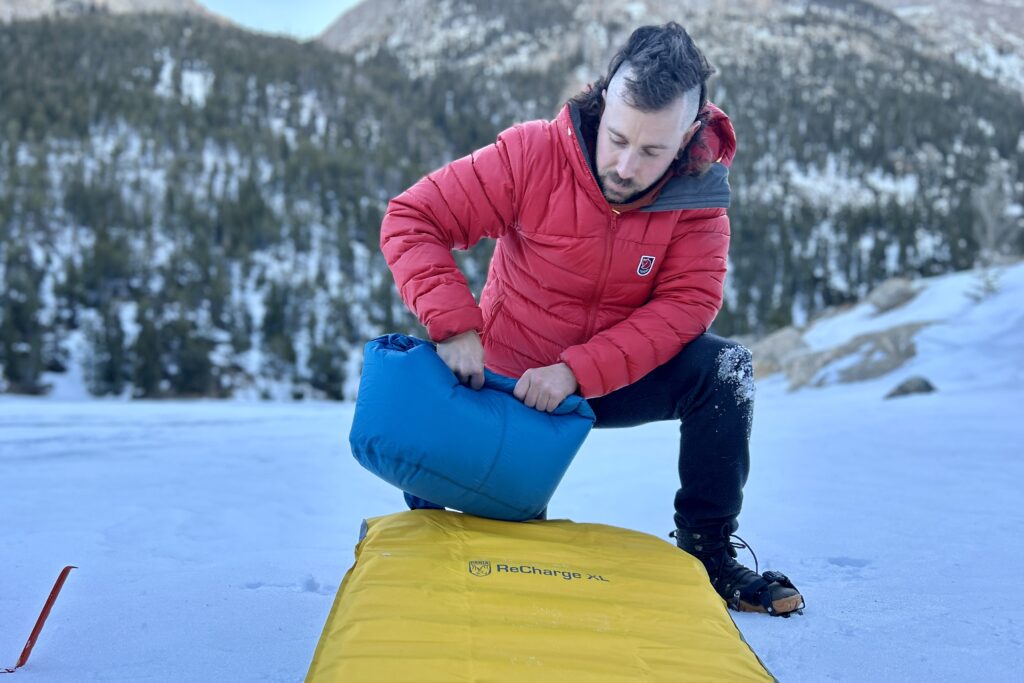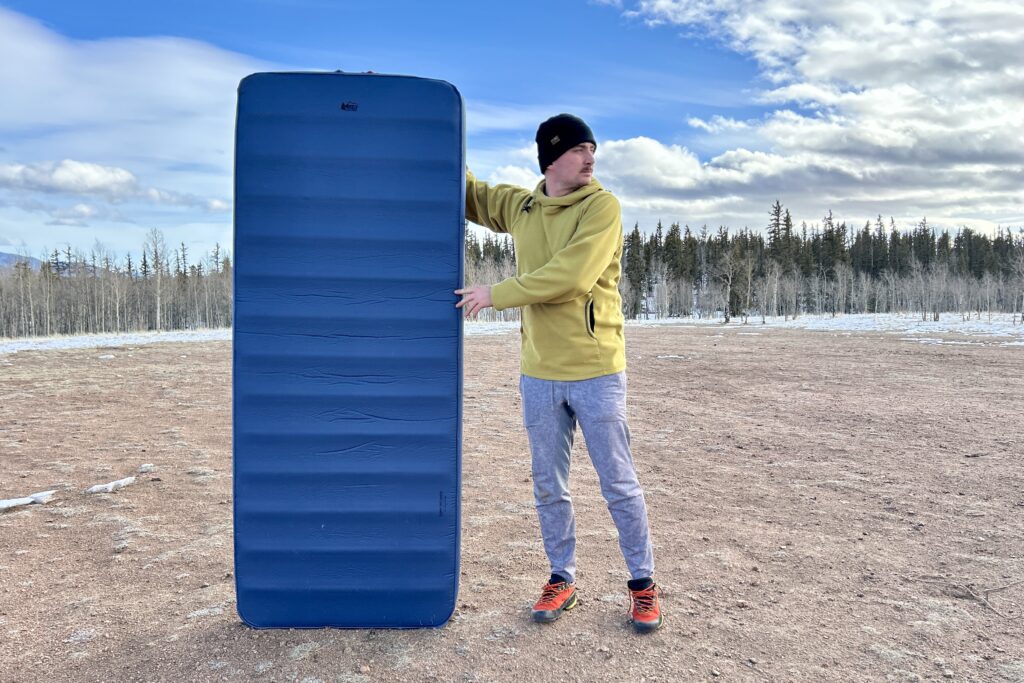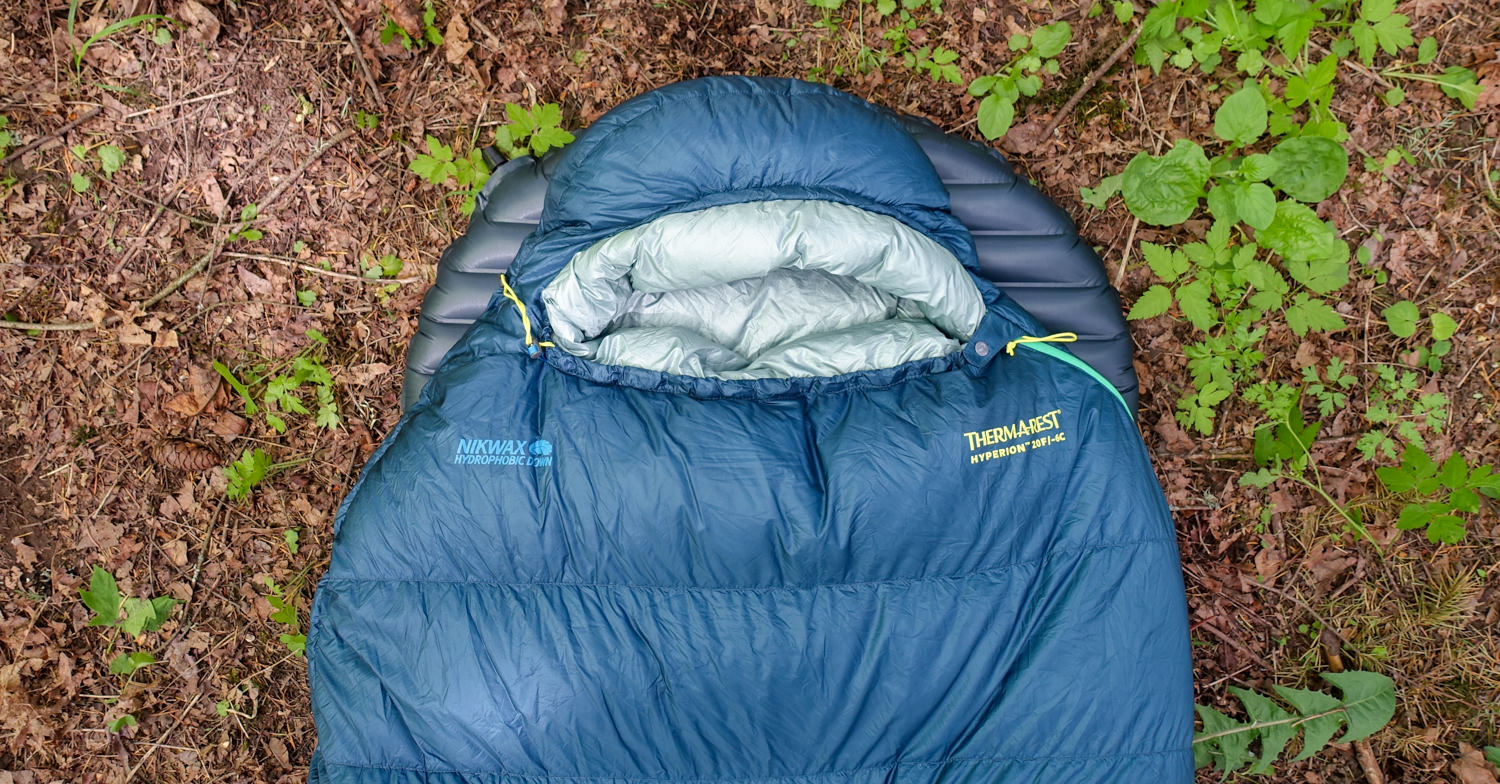
The Hyperion is the newest sleeping bag in Therm-a-Rest’s Fast and Light line and it’s one of the lightest and most compressible bags we’ve ever tested. The Hyperion comes in two temperature ratings (20°F and 32°F), which both use very high-quality 900-fill-power down to make them extremely warm while keeping weight to an absolute minimum. These high-performance sleeping bags are some of the best on the market for ultralight compressibility, which makes them an excellent choice for hardcore backpacking trips.
The downside with going so light is that some features and comforts get cut out along the way. For example, the Hyperion has a narrow cut, which may feel restrictive to some, and it only has a half-length zipper, which limits its versatility. That said, if you don’t mind a snug fit (usually sound back sleepers) and are okay with a short zipper, the Hyperion is a truly excellent ultralight sleeping bag.
Quick Specs
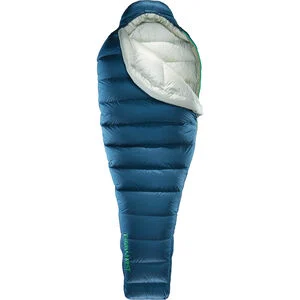
Therm-a-Rest Hyperion 20°F
Price: $499.95 (Regular Size)
EN Lower Limit Rating: 20°F (Will keep you alive)
EN Comfort Rating: 32°F (Will keep you warm)
Weight (Regular Size): 1 lb. 4 oz.
Fill Type: 900-fill-power Nikwax Hydrophobic goose down (responsibly sourced)
Length: Regular size fits up to 6 ft. tall, Long size fits up to 6’6” (bump up in size if close)
Girth: 57 in. at the shoulder/ 49.5 in. at the hip/ 43 in. at the footbox
Packed Size: 6 x 8 in.
Pros
- Ultralight
- Compact
- Warm
- EN Rating
- Connectors
- Quality materials
Cons
- Narrow cut
- Half-zip
- Zipper snags
- Price
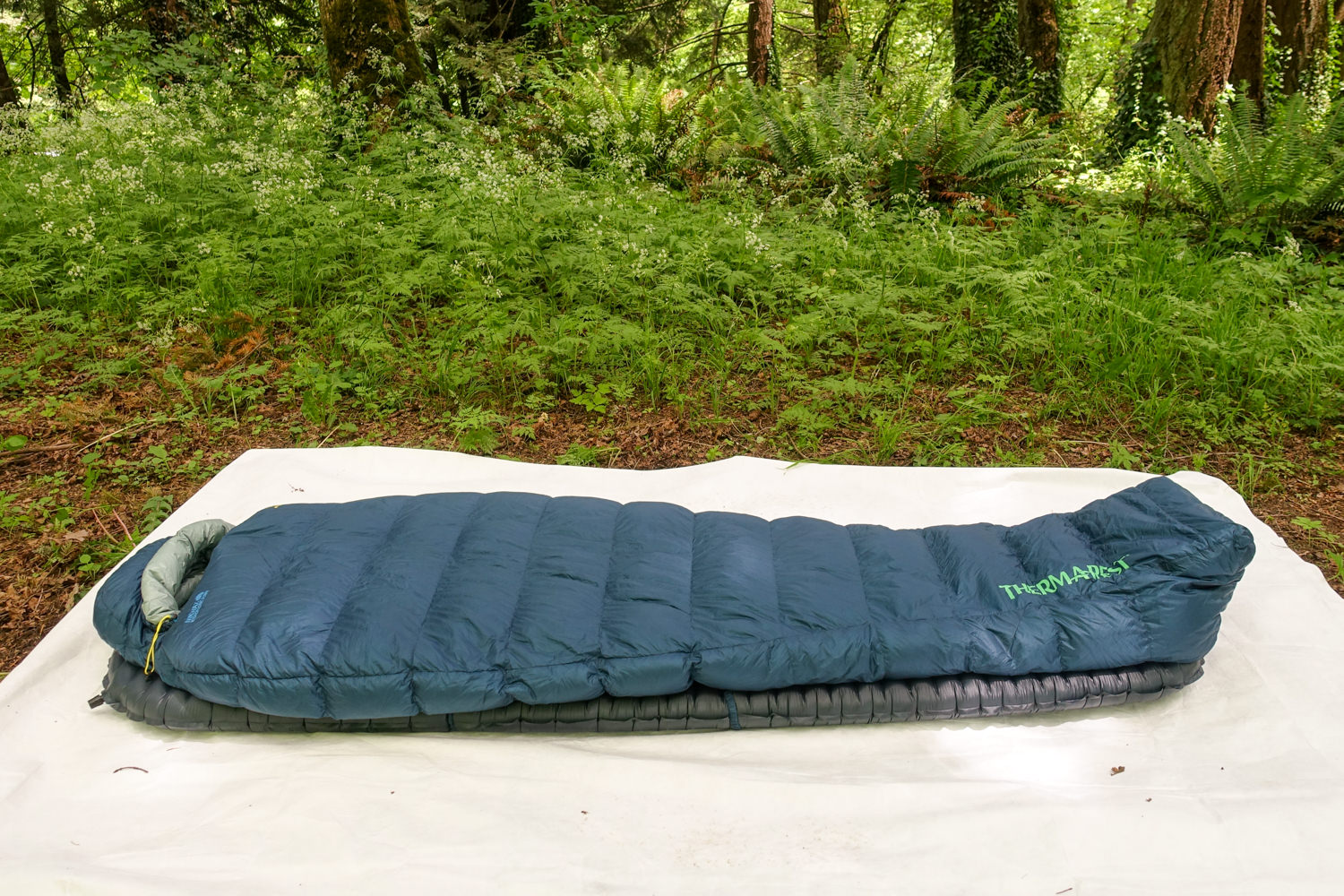
Pros
ULTRALIGHT
The Hyperion is crazy light for a mummy bag. It’s fully-hooded and encapsulating, yet weighs only 1 lb. 4 oz. (regular size), which is closer to the weight of a quilt (if not lighter!). Comparatively, other sleeping bags in the same class are typically 8-10 ounces heavier, which is more than half a pound. That’s a pretty huge weight savings in the ultralight backpacking world. The exceptional quality of the down used in the Hyperion and it’s narrow cut gives this bag an outstanding warmth-to-weight ratio. Your sleeping bag will be one of the heaviest items in your backpack, so it’s critical to choose one that’s as light as possible, while still being warm enough to handle whatever nighttime temps you’ll encounter.
COMPACT
The premium down in the Hyperion also makes it extremely packable. With the help of the included compression sack, we can easily condense the Hyperion down to roughly the size of a 1L water bottle. That’s outstanding for saving space in your backpack, which is always a nice benefit.
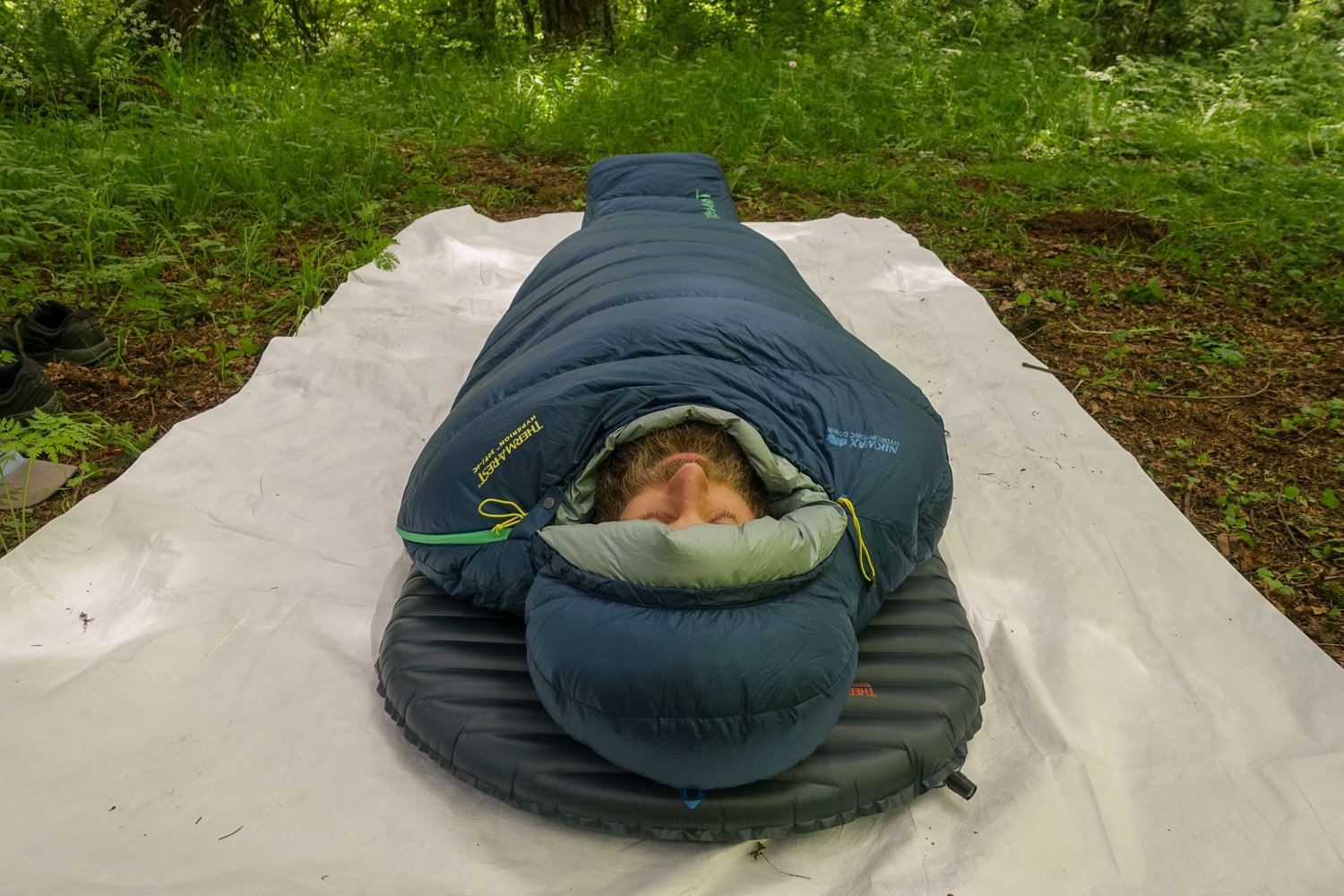
WARM
In our experience, the 20°F Hyperion model has been plenty warm for near-freezing early spring nights in the Pacific Northwest. Since 70% of its down is on the top where it won’t be compressed, it does a great job of retaining body heat. This is also an area where the slim design is an asset. Less dead air space inside the bag means your body can warm it up quickly and efficiently. Well-placed baffles around the neck and hood also allow you to cinch the bag snuggly around your face during the coldest conditions, maximizing your thermal retention even further.
EN RATING
European Norm (EN) is a standardized temperature rating system that keeps ratings consistent across the industry. The number listed with most sleeping bags, for example, Therm-a-Rest Hyperion 20°, is the EN Lower Limit. The “lower limit” rating tells us at what temp the bag will keep us alive, but not to what degree it will keep us comfortable. EN Comfort Ratings are usually about 10-15° warmer than EN Lower Limit ratings, which we find to be a much more realistic and helpful rating. Not all sleeping bag manufacturers list comfort ratings, but Therm-a-Rest thankfully does. The Hyperion 20° has an EN Comfort Rating of 32°F, which should keep you cozy down to about freezing. In general, bags with EN Lower Limits between 10°F and 30°F are considered good 3-season bags depending on your sleeping style and weather conditions.
For more details about temperature ratings and how to choose the right sleeping bag, check out our 10 Best Backpacking Sleeping Bags guide.
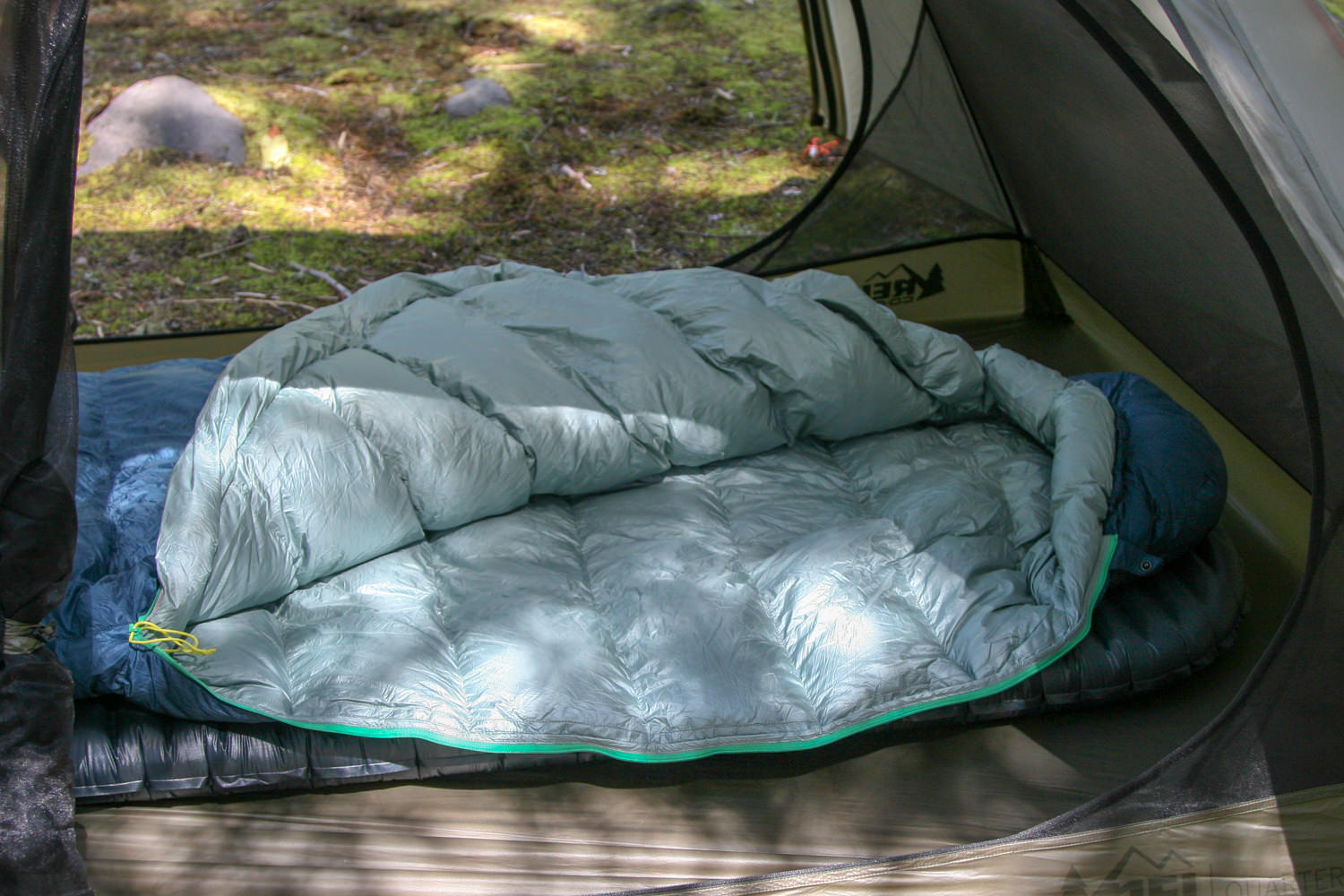
CONNECTORS
The Hyperion comes equipped with simple hook-and-strap pad connectors that join the bag with a sleeping pad. The pad connectors help maximize warmth by keeping the sleeping bag (which has less down on the bottom) centered. The connectors are a nice extra feature, but keeping track of the straps might be more cumbersome than it’s worth at times. We still think including them is a nice touch though, and you might find them handy.
QUALITY MATERIALS
The materials used in the Hyperion are the best of the best. The 900-fill-down was chosen for its exceptional quality and makes it possible for this bag to be so amazingly light and packable. Prime down is a significant upgrade that puts this sleeping bag a cut above the rest performance-wise. Therm-a-Rest also used hydrophobic Nikwax treated down, which helps repel moisture and keep the bag performing at its highest potential longer.
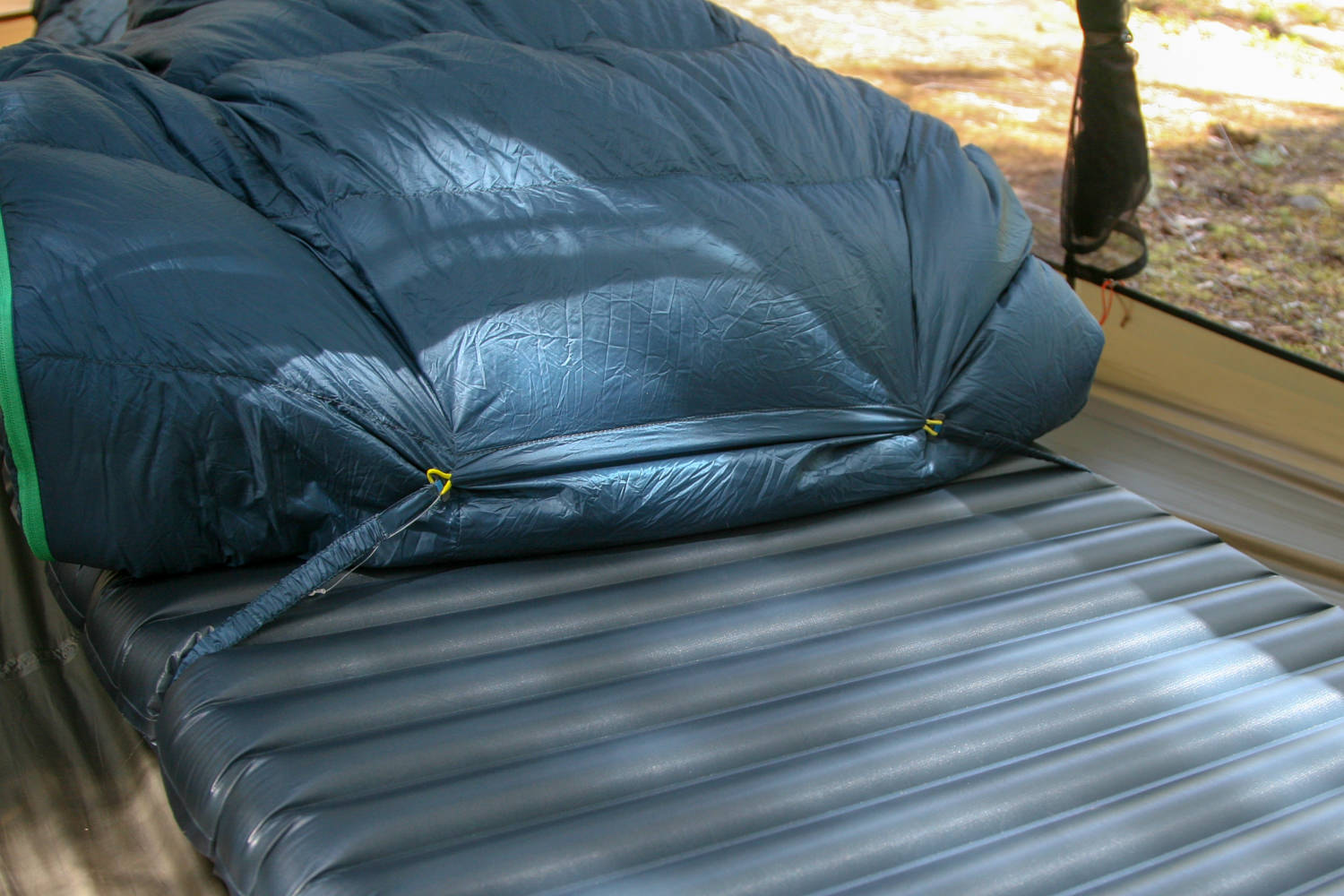
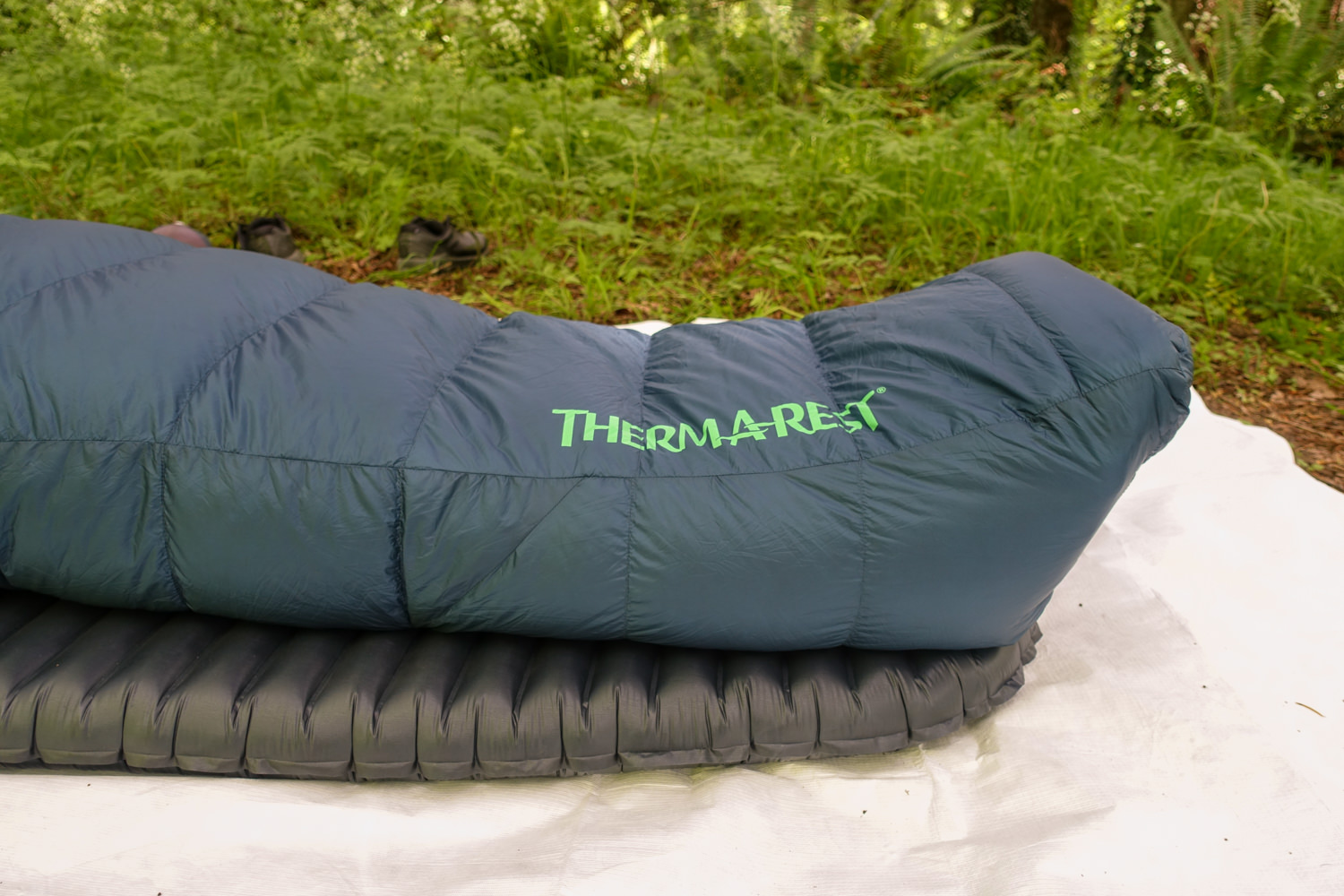
Cons
NARROW CUT
The Hyperion’s girth is 57 inches at the shoulder, 49.5 in. at the hip, and narrows to 43 in. at the footbox. These measurements are among the narrowest we’ve seen in the sleeping bag industry. Slim-cut bags are great for saving weight and efficient warmth, but they do tend to be more restrictive. The Hyperion is among the tightest-fitting sleeping bags we’ve tested and for our sleeping styles (side sleepers that squirm around a lot) we’ve found it to be a bit constricting. That said, the Hyperion still might be a great fit for hikers with a slender build who sleep mostly on their backs, and tend not to move around a ton at night. This is definitely an area of personal preference.
HALF-ZIP
Another way the Hyperion keeps its weight to a minimum, is by using a half-length zipper. Full-length zippers are ideal because they give you the ability to open the bag completely for ventilation on warm nights. If you almost always like your feet to be tucked in and your sleeping bag zipped up, a half-length zipper might work well for you, but we’ve found that most backpackers prefer the adjustability of full-length zippers, us included.
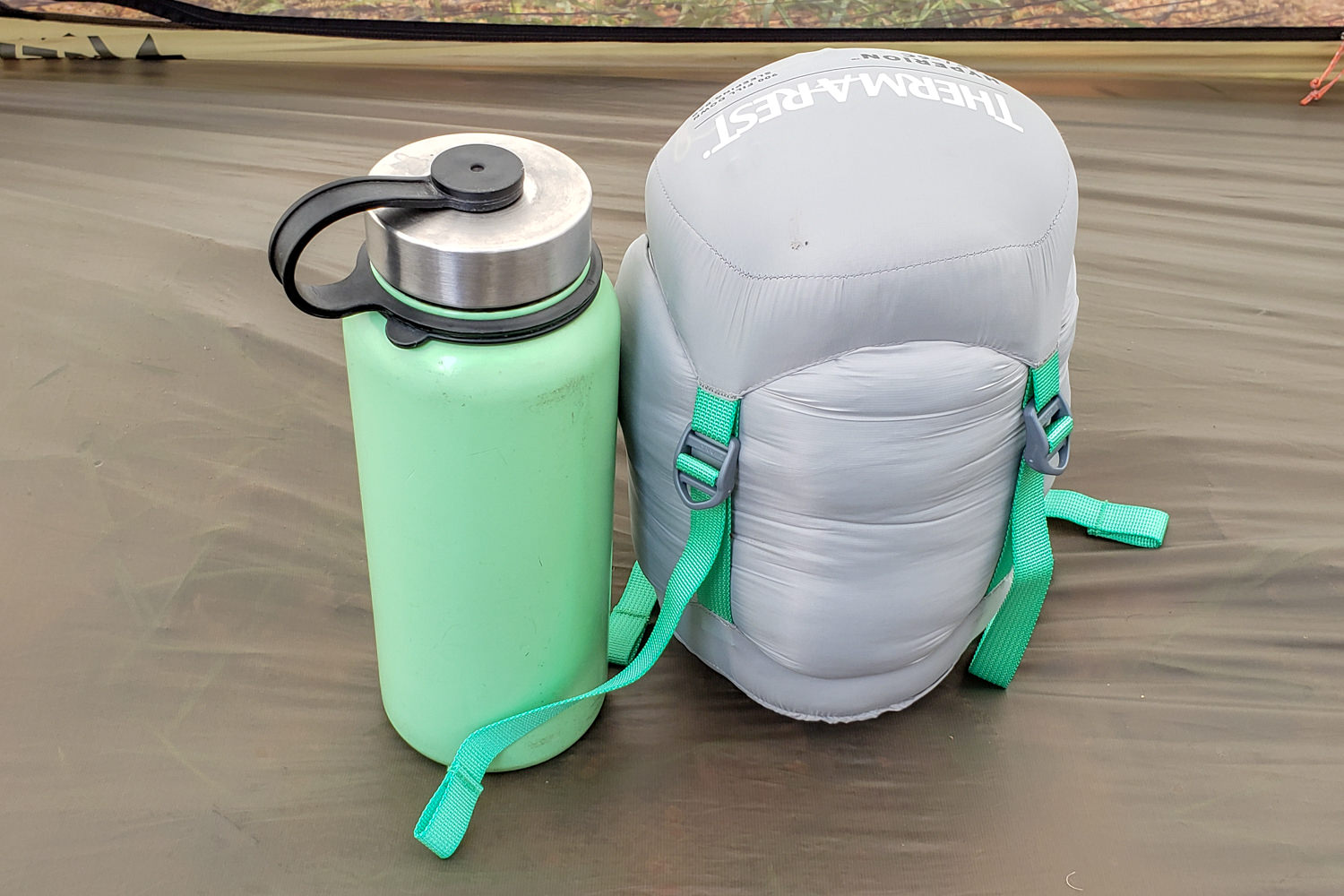
ZIPPER SNAGS
It’s not a huge deal, but the zipper on the Hyperion felt a little cheap to us and had a tendency to snag. We know the ultimate goal is for the bag to be ultralight, but we prefer slightly larger, less finicky zippers that slide smoothly and have a flap to keep the fabric from snagging.
PRICE
The Hyperion is a fairly expensive sleeping bag, but when you take into account the quality of its materials, its price makes sense. Some manufacturers may offer down of this quality as an upgrade option, which increases the cost of their bags. If you compare the Hyperion with other bags made with similar materials, its price is competitive. Also, it’s important to remember that high-quality down products will last a very long time (decades even) if treated with care.
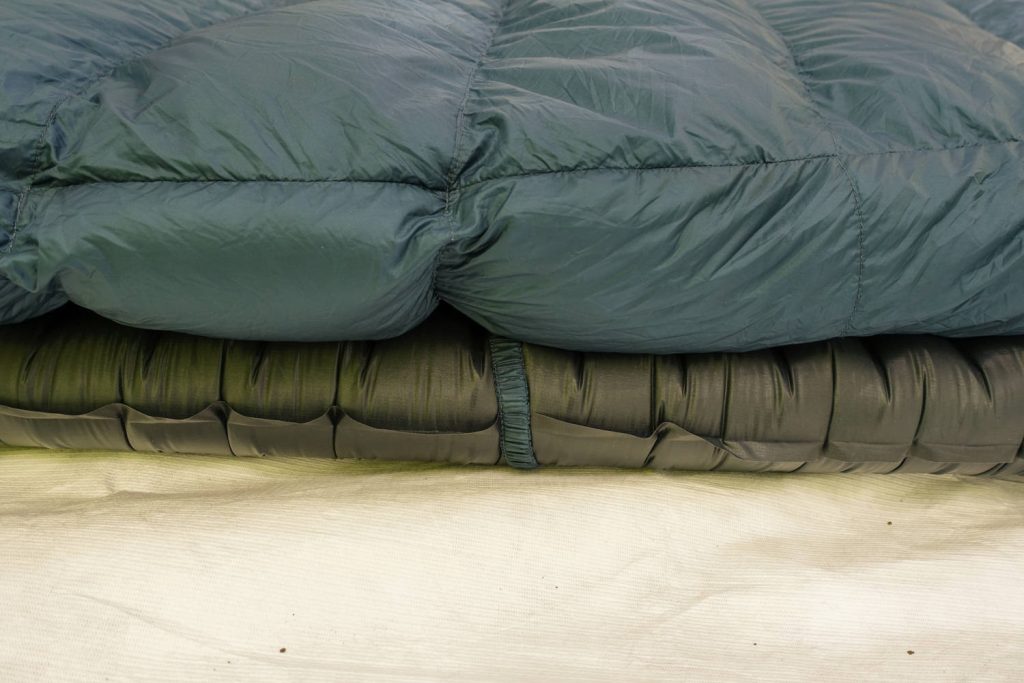
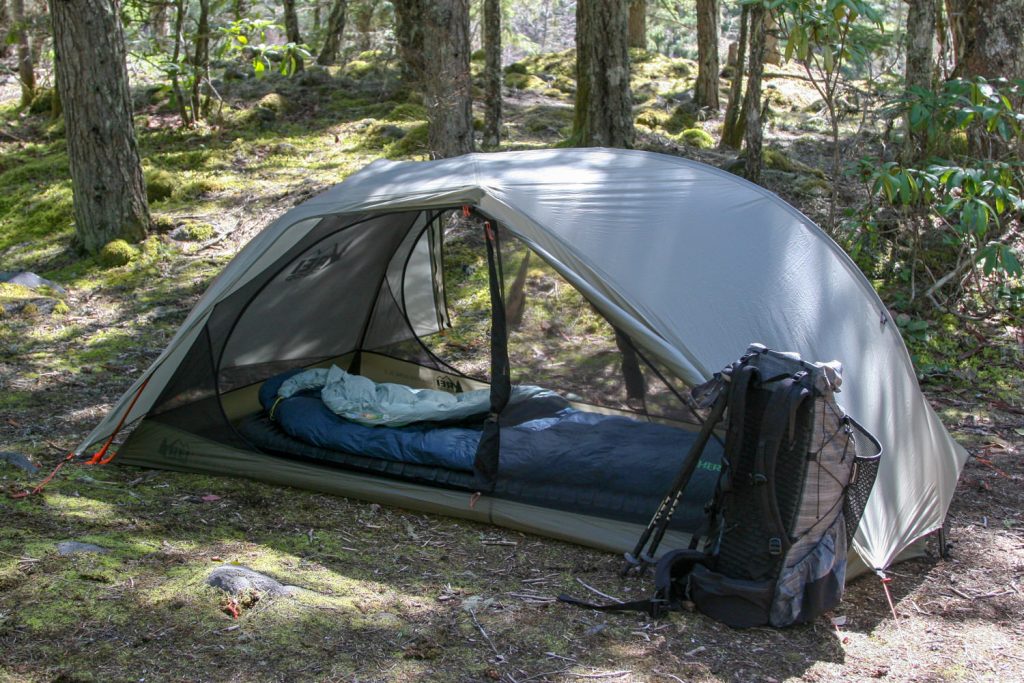
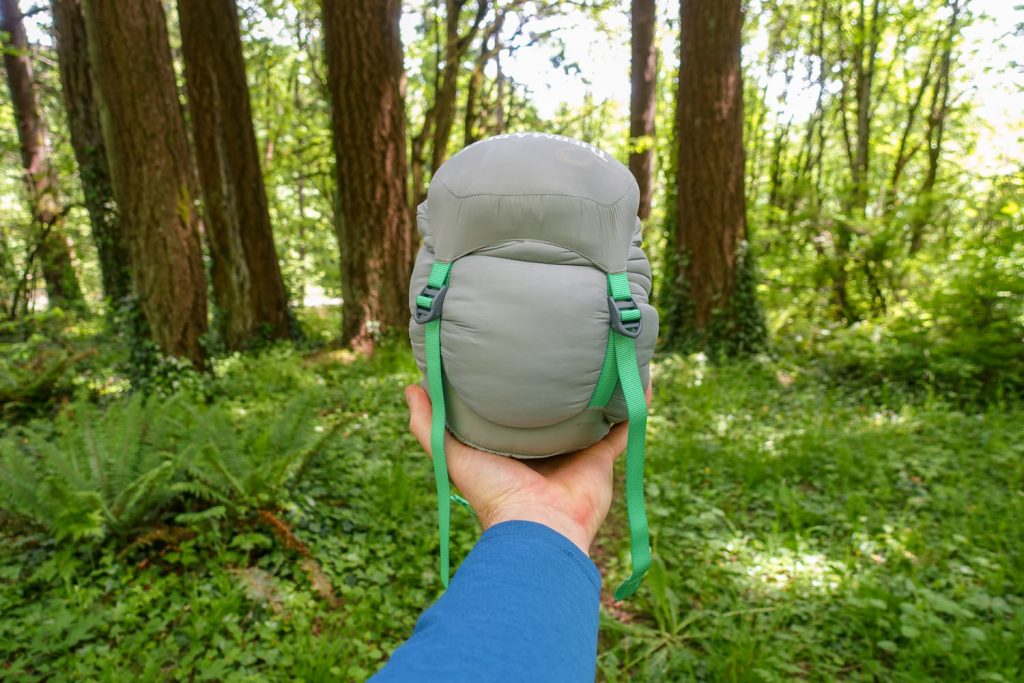
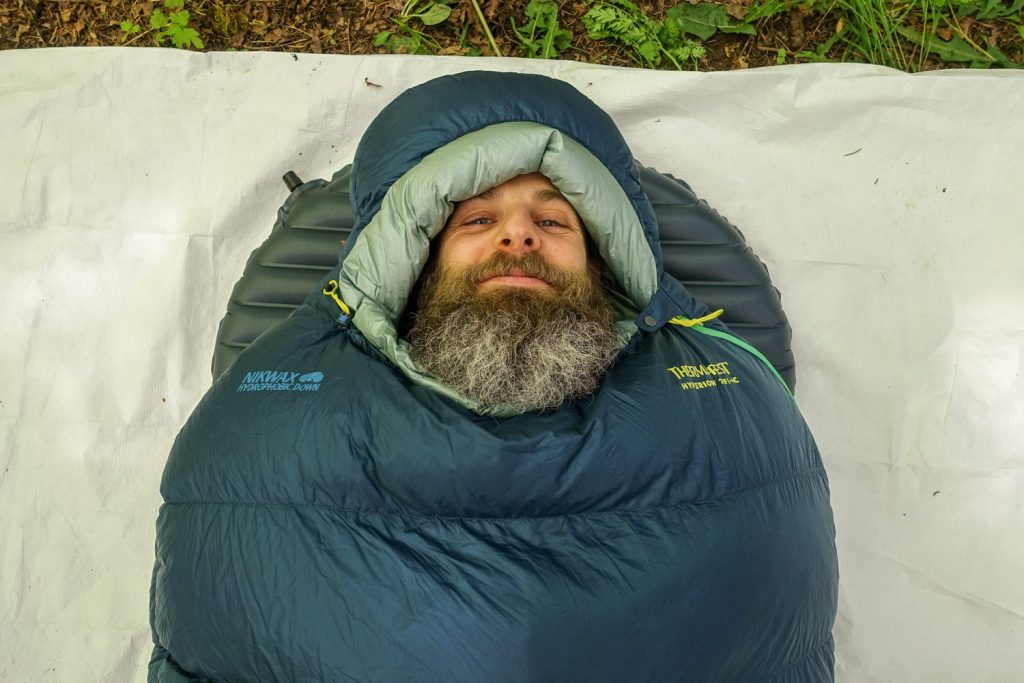
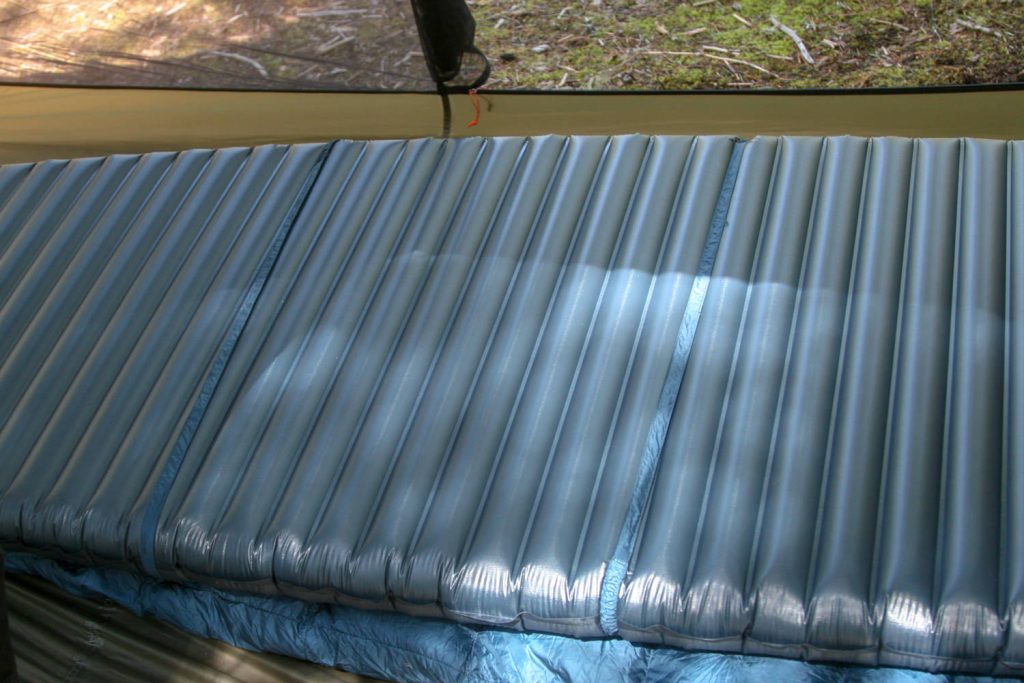
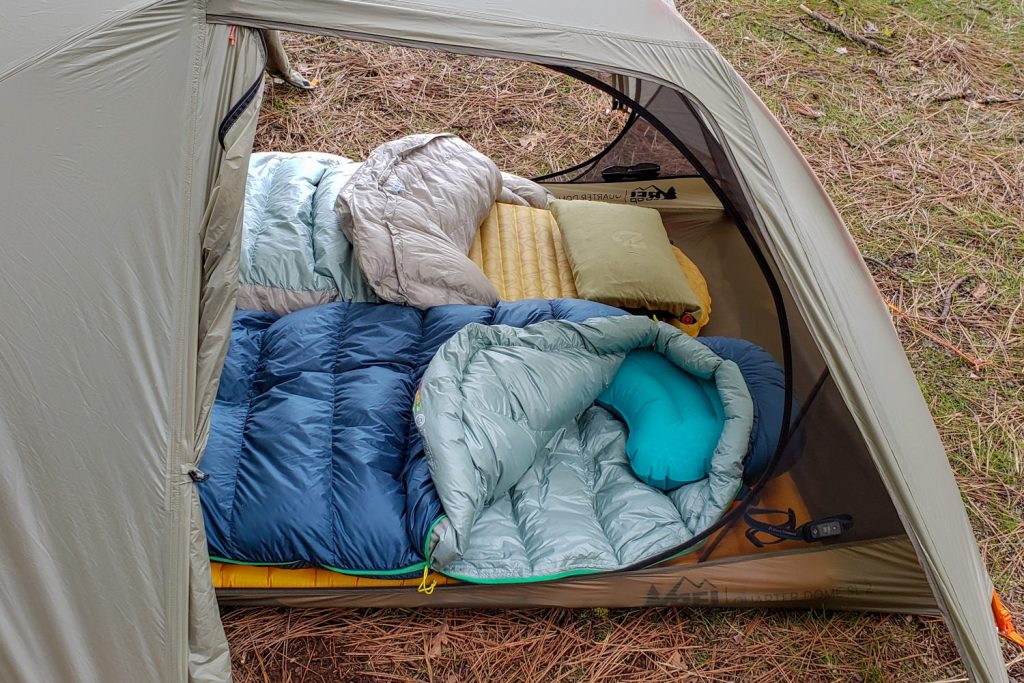
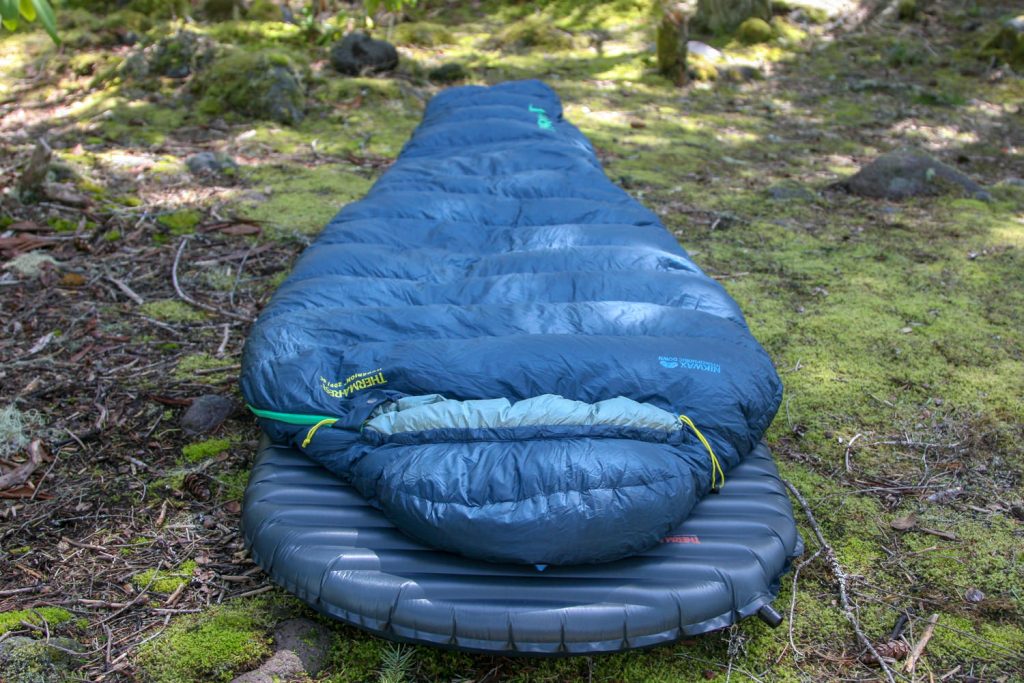
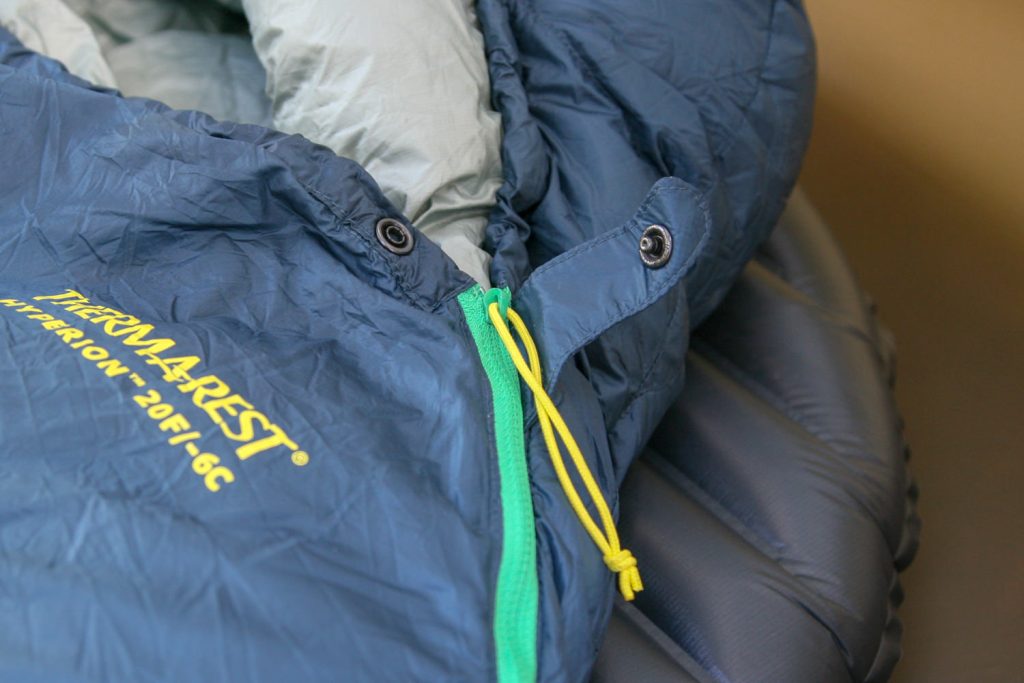
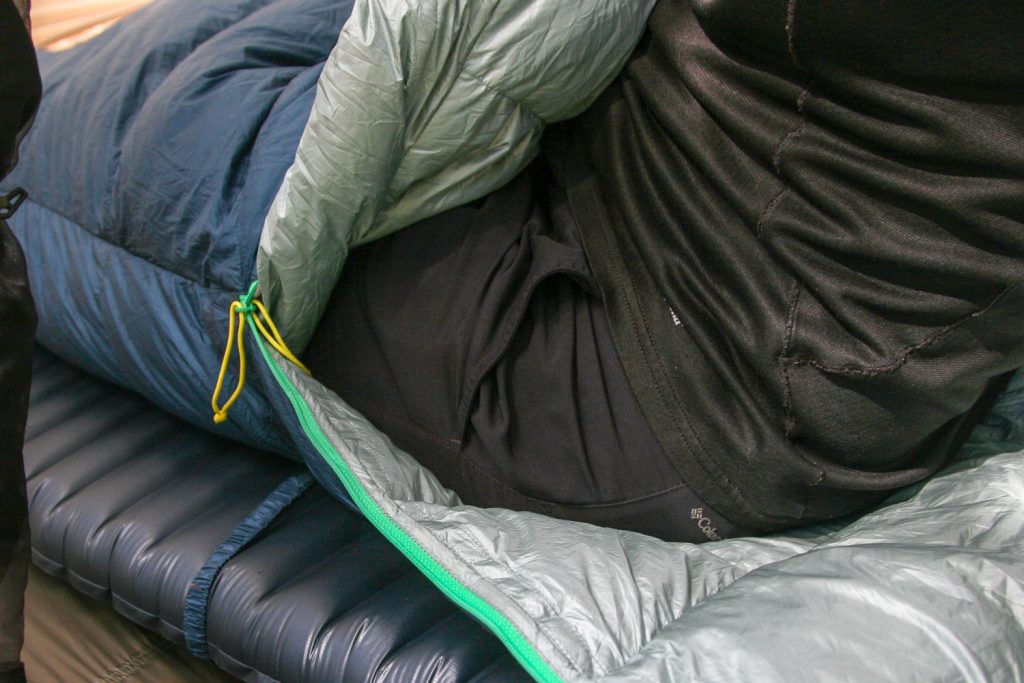
Bottom Line
Therm-a-Rest’s Hyperion 20° Sleeping Bag focuses on keeping weight to an absolute minimum while providing a great deal of warmth. It’s a very well-constructed sleeping bag made with high-end materials and it packs down ridiculously small. The tradeoff for its ultralight weight and size does leave a bit to be desired from our point of view though. The Hyperion’s half-zip design limits its versatility, as it can’t be opened fully for ventilation on warm nights. Also, the cut of the Hyperion is narrower than the average sleeping bag, which will feel constricting to some, and may not be a great fit for side sleepers.
While there are some downsides with the Hyperion, we still feel that Therm-a-Rest has designed a very high-quality sleeping bag that offers incredibly competitive specs in weight, warmth, comfort, and compression for fast and light adventurers.
For more of our favorite sleeping pads, check out our list of the 10 Best Backpacking Sleeping Pads.
